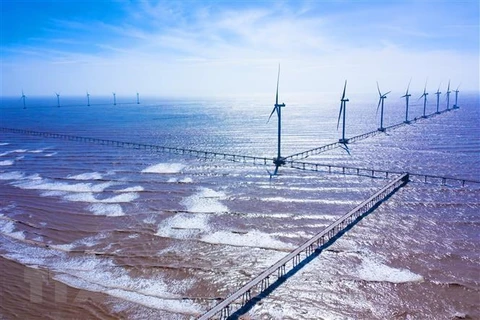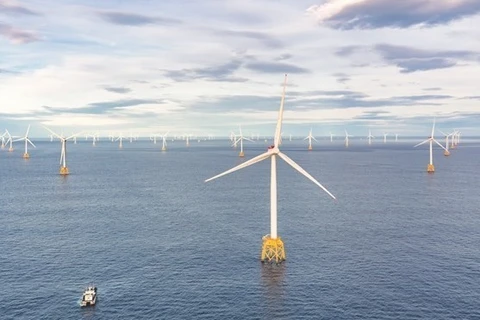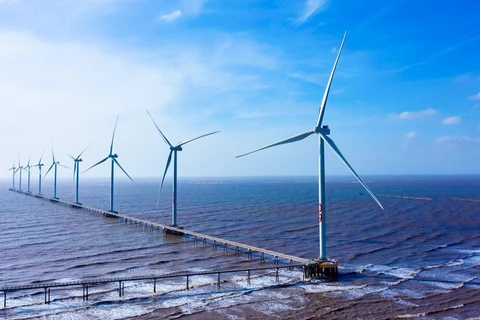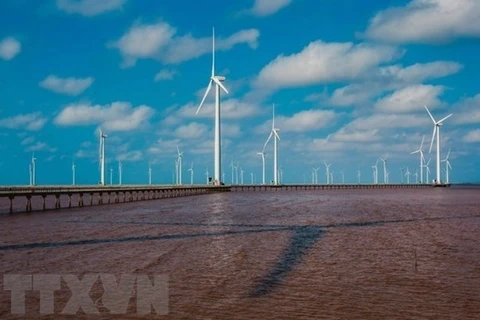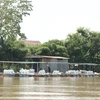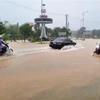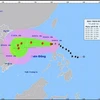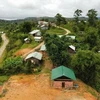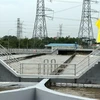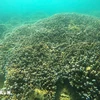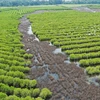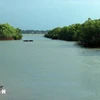Hanoi (VNA) - A workshop discussing the potential for developing offshore wind power and marine spatial planning in Vietnam towards the blue economy was held by the Norwegian Embassy in Vietnam and the UN Development Programme (UNDP) in collaboration with the National Assembly's Committee for Science, Technology and Environment, in Hanoi on April 20.
The event saw the participation of representatives from key agencies related marine spatial planning in Vietnam including the Vietnam Administration of Seas and Islands (VASI) under the Ministry of Natural Resources and Environment, the Electricity and Renewable Energy Authority of the Ministry of Industry and Trade, the Vietnam Oil and Gas Group (Petrovietnam), the German Corporation for International Cooperation (GIZ), the World Bank, the Foundation for Scientific and Industrial Research (SINTEF) of Norway, embassies, international organisations.
Dr. Ta Dinh Thi, Deputy Director of the NA’s Committee for Science, Technology and Environment said Vietnam boasts huge potential for offshore wind power development, especially south-central coastal localities such as Binh Thuan, Ninh Thuan, Khanh Hoa, Phu Yen and Binh Dinh.
He stressed that to realise net zero emissions by 2050, Vietnam needs to accelerate the development of renewable energy, improve energy efficiency and focus on energy conversion with an appropriate roadmap, while ensuring objectives of environmental protection and response to climate change.
Developing renewable energy is a major policy of the Party, National Assembly and Government of Vietnam, in which offshore wind power is considered as one of the breakthrough solutions to promote energy transformation and ensure national energy security, he said.
This is closely related to marine spatial planning, especially identifying potential water areas and reasonable zoning for offshore wind power development, he added.
For areas being planned for developing offshore wind power, in-depth studies are required, in order to make specific recommendations, Thi noted.
The results of the workshop will help the NA gain more information and knowledge, especially international experience in marine spatial planning, renewable energy development; as well as consultation on building and perfecting relevant policies and laws, he said.
Delegates shared international experiences and next steps in developing marine spatial planning and offshore wind power in Vietnam.
They highlighted the crucial role of marine spatial planning in identifying suitable areas for offshore wind energy projects; and the importance of promoting innovative technologies in developing the blue economy, responding to impacts of climate change, and promoting energy transition.
Ramla Khalidi, UNDP Resident Representative in Vietnam, said that accelerating marine spatial planning is essential to unlocking the great potential of offshore wind power development in Vietnam, contributing to implementing sustainable development goals and climate change response goals.
The participation of all stakeholders in the scheme, especially the local community, plays an important role in ensuring that benefits are shared equitably and vulnerable groups are protected, she said.
Norwegian Ambassador to Vietnam Hilde Solbakken affirmed that her country is committed to working with partners in Vietnam to promote sustainable green growth, protect the marine environment and support energy transition in Vietnam.
She stressed that marine spatial planning will help the ocean to be managed sustainably, and play an important role in realising a shared vision of a green, sustainable and prosperous future, which will ensure that all industries will benefit from the ocean while marine ecosystems and biodiversity are still conserved./.
The event saw the participation of representatives from key agencies related marine spatial planning in Vietnam including the Vietnam Administration of Seas and Islands (VASI) under the Ministry of Natural Resources and Environment, the Electricity and Renewable Energy Authority of the Ministry of Industry and Trade, the Vietnam Oil and Gas Group (Petrovietnam), the German Corporation for International Cooperation (GIZ), the World Bank, the Foundation for Scientific and Industrial Research (SINTEF) of Norway, embassies, international organisations.
Dr. Ta Dinh Thi, Deputy Director of the NA’s Committee for Science, Technology and Environment said Vietnam boasts huge potential for offshore wind power development, especially south-central coastal localities such as Binh Thuan, Ninh Thuan, Khanh Hoa, Phu Yen and Binh Dinh.
He stressed that to realise net zero emissions by 2050, Vietnam needs to accelerate the development of renewable energy, improve energy efficiency and focus on energy conversion with an appropriate roadmap, while ensuring objectives of environmental protection and response to climate change.
Developing renewable energy is a major policy of the Party, National Assembly and Government of Vietnam, in which offshore wind power is considered as one of the breakthrough solutions to promote energy transformation and ensure national energy security, he said.
This is closely related to marine spatial planning, especially identifying potential water areas and reasonable zoning for offshore wind power development, he added.
For areas being planned for developing offshore wind power, in-depth studies are required, in order to make specific recommendations, Thi noted.
The results of the workshop will help the NA gain more information and knowledge, especially international experience in marine spatial planning, renewable energy development; as well as consultation on building and perfecting relevant policies and laws, he said.
Delegates shared international experiences and next steps in developing marine spatial planning and offshore wind power in Vietnam.
They highlighted the crucial role of marine spatial planning in identifying suitable areas for offshore wind energy projects; and the importance of promoting innovative technologies in developing the blue economy, responding to impacts of climate change, and promoting energy transition.
Ramla Khalidi, UNDP Resident Representative in Vietnam, said that accelerating marine spatial planning is essential to unlocking the great potential of offshore wind power development in Vietnam, contributing to implementing sustainable development goals and climate change response goals.
The participation of all stakeholders in the scheme, especially the local community, plays an important role in ensuring that benefits are shared equitably and vulnerable groups are protected, she said.
Norwegian Ambassador to Vietnam Hilde Solbakken affirmed that her country is committed to working with partners in Vietnam to promote sustainable green growth, protect the marine environment and support energy transition in Vietnam.
She stressed that marine spatial planning will help the ocean to be managed sustainably, and play an important role in realising a shared vision of a green, sustainable and prosperous future, which will ensure that all industries will benefit from the ocean while marine ecosystems and biodiversity are still conserved./.
VNA


